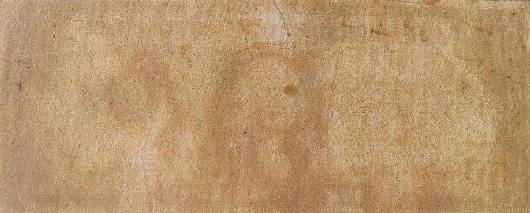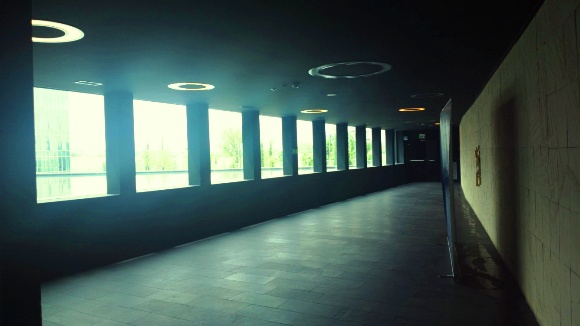“No-one knows the
outcome of a path that starts from the union of the perceiver and the
perceived – of subject and object – in a single universe”
(Gregory Bateson)
“A universe comes into being when a space is subdivided or eviscerated”
and that “boundaries can be drawn anywhere we please”, therefore, from
the primeval creative act to distinguish, infinite universes are
possible. (G. Spencer Brown)
Friday 30 September, 2016, during the
European Night of Researchers at the Italian Space Agency of
Rome-Tor Vergata area office opened to the public. Within the programme
initiated by ASI attention is drawn to the participation of the artist
Paolo Monti who, for the occasion, will present his audiovisual
installation Track Money. Where’s George? in which, with great
freedom of language, different material taken from archives for a
story-telling, driven towards the future, a propos his research between art
and science.
The video-installation occupies 11 windows of the room near the ASI
Auditorium, like an allegory of an expanding vision where the multiplicity
alongside of the gazes permits a knowledge of the work in all its
complexity. It originates from the meta-project
InfraTazebAu s'pace. Information in
revolution. C.G.B. An epistemologically propelled satellite. R.F.I.D. Shroud
21’37” – where C.G.B. is the acronym of the Circle dedicated to the
epistemologist Gregory Bateson to whom the project is dedicated - started in
2005 as an exchange between the populations of the 13 nations crossed along
the journey (and the photos which documented the numerous people who signed
the bank notes–object treated by Monti testify) which from Venice to Beijing
re-traced the Silk Road on the tracks of Marco Polo.
Subsequently, in 2006, in Frascati in the area office of the ESA-ESRIN the
astronaut Paolo Nespoli signed one of the many divested bank notes,
almost to symbolise that the journey could continue into outer-space. That
is how Shroud 21’37” came about, a piece constituted of a
bleached-out dollar note that still shows traces of George Washington’s
features, placed aboard the micro-satellite in Rome, in June 2011 – a
programme of the ASI co-ordinated by G.A.U.S.S. (Astrodynamic Group at
Sapienza University of Studies) – and launched into orbit 17 August, 2011,
from the space centre at Yasny in Russia.


«With the creation of this satellite we wanted to unite science with art
by installing on board Paolo Monti’s work Sindone 21’ 37”, comprising of
a “bleached out” dollar deprived of its symbols which was signed by all
of us at Gauss and the artist himself. This work falls into the most
ample gamma of Monti’s work that aims at pauperizing money with an aim
to transform it from being a symbol of power to one of union» (Chantal
Cappelletti, G.A.U.S.S. Project Coordinator)
The satellite EduSAT was elected by Monti for his personal gallery, and
first gallery in orbit, in homage to Lucio Fontana’s Spatialism and Yves
Klein’s “Volo” (Flight). EduSAT’s flight path is visible in real time thanks
to NORAD ID: 37788
www.n2yo.com/?s=37788
In 2015, a twinning was set in motion between the “Gallery in Orbit EduSAT
37788” and the “Pied à Terre” in Rome, a station where it is possible to
follow the work-in-progress of the work described in the images classified
in “Tassonomie spaziale” (Spatial Taxonomy). There is a future twinning
programmed between the Gallery in Orbit 37788 in a sort of “Panopticon for
the observation of the Creation”.
The invitation from ASI to host Track Money. Where’s George? during the
European Night of Researchers at the Italian Space Agency presents the
occasion for his work to be known in all its complexity, involving those who
participated in the realisation of the
EduSAT project, from its very
launching right up to the tracking of the satellite with Sindone 21’37” on
board. A look down upon the earth from its sun-synchronous orbit at an
altitude of 700 km and speed of 28.000 km/h., 7km/s.
EduSAT is a project which foresees a didactic route for students to approach
the world of outer space. The project has contemplated a thick network of
collaboration between the Agenzia Spaziale Italiana (Italian Space Agency),
high schools (spread over the entire national territory), Ministry of
Education of the University and Research, university professors at the Rome
University “La Sapienza” (in particular
GAUSS – Astrodynamic group) and “Tor
Vergata” (in particular the Department of Telecommunication Engineering) and
enterprises in the sector (IMT srl – Engineering in Marketing & Technology).
www.asi.it/it/educational/a-scuola-di-scienza/progetto-edusat
The exhibition goes side-by-side with a conference in the Cassini Room,
co-ordinated by Paolo D’Angelo, scientific journalist and space historian,
with the participation of Vito Potente, professor Emeritus and co-ordinator
of the EduSAT project for IISS “Marconi” of Bari, Andrea Negri, engineer at
IMT srl, Luigi Campanella, distinguished professor and President of MUSIS,
Denis Fadda, professor of international law and Président honoraire de
l'Académie des Sciences d'outre-mer, Roberto Somma, renowned expert in the
field of outer-space, Piero Pala, independent art critic, and concluding
with an intervention of the artist himself, Paolo Monti.
The exhibition is dedicated to the last flight in orbit of the Rosetta
Mission and to Angioletta Coradini « Lady of the Planets ».
www.asi.it/it/news/notte-dei-ricercatori-al-via


www.frascatiscienza.it/pagine/notte-europea-dei-ricercatori-2016/programma